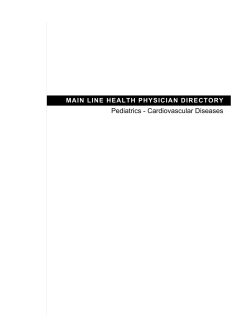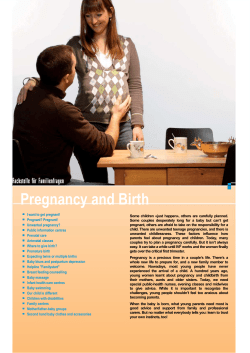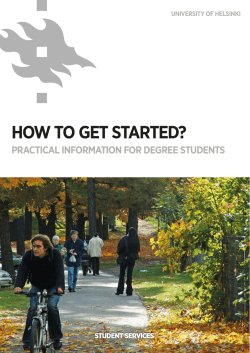
What happens to information about your child?
Contact Details What happens to information about your child? • We will only work directly with your child after you have signed a consent form. • We treat all information about your child as confidential. When you sign the consent form, you consent to your child being assessed and a written report being sent to the School Principal. The psychologist will offer to meet you to discuss the report and, if you request a written copy of the report, we will send it to you. • If we need to consult another person or agency about your child, we will ask you to sign another, different, consent form. We will only consult others in relation to your child after we have your written consent. • We will keep a record on your child, containing all relevant information that has been gathered, including notes and copies of reports. The record will be kept in a safe place. We also make a short electronic version of the record, containing your child’s name and address, dates of appointment, reason for referral and our findings in order to help us manage our files and records and for statistical purposes • In general, parents are welcome to look at any records that NEPS holds on their child, simply by contacting the psychologist involved. You should also be aware that all records about your child are covered by the Freedom of Information Act and the Data Protection Act. These laws set strict rules to protect privacy and they give you certain rights. Quality Customer Service NEPS is committed to a quality customer service. We aim to provide an effective and professional service, and strive to adhere to the Department of Education and Science customer service charter. If, however, you have concerns about the NEPS service you can discuss these with the NEPS psychologist working with your child’s school. If you feel you need to take the matter further you can contact the Regional Director. NEPS Head Office Frederick Court, 24/27 North Frederick Street,Dublin 1 Tel: (01) 889 2700 Eastern Region (Northern Area) Regional Office Frederick Court, 24/27 North Frederick Street, Dublin 1. Tel: (01) 889 2787/89 Eastern Region (South Western Area) Regional Office 50 Tower Road, Clondalkin, Dublin 22. Tel: (01) 4614824 Local Office The Maudlins, Naas, Co Kildare. Tel: 045 848504 Eastern Region (East Coast Area) Regional Office Third Floor, Trident House, Blackrock, Co. Dublin. Tel: 01 2833028 Midlands Region North-Western Region Regional Office Westward Centre, Bridge St. Sligo. Tel: 071 9141322 Local Office C/O Government Buildings, High Road, Letterkenny, Co. Donegal. Tel: 074 9121421/071 9141322 South-Eastern Region Regional Office 108 The Quay, Waterford. Tel: 051 850358 Local Office C/O Vocational School, Raheen Rd, Clonmel, Co. Tipperary Tel: 052 25833 Local Office The Bushels, Cornmarket, Wexford. Tel: 053 43300/052 25833 Regional Office Friars Mill Road, Mullingar, Co Westmeath. Tel: 044 37004 Local Office VEC Admin Offices, Athy Road, Carlow. Tel: 059 9138582/052 25833 Mid-Western Region Southern Region Local Office Francis Street, Ennis, Co Clare. Tel: 065 6865904/021 4536358 Local Office Clounalour, Oakpark, Tralee, Co. Kerry. Tel: 066 7102690 North-Eastern Region Western Region Local Office Donore Rd. Ind. Estate, Drogheda, Co. Louth. Tel: 041 9876940 Local Office C/O Brothers of Charity Offices, Lanesboro Rd., Roscommon. Tel: 0906 628529 Regional Office Rossbrien Road, Punch’s Cross, Limerick. Tel: 061 430004/021 4536358 Regional Office 43 Cannon Row, Navan, Co. Meath. Tel: 046 9093310 Local Office 7 Farnham Street, Cavan. Tel: 049 4332766 /046 9093310 Regional Office Block C, Heritage Business Park, Mahon, Cork. Tel: 021 4536358 Working together to make a difference for children Information for parents Regional Office Victoria Place Eyre Square, Galway. Tel: 091864518 Local Office Thomas Street, Castlebar, Co. Mayo. Tel: 094 9028310 Web: www.education.ie/neps E-mail: neps@neps.gov.ie National Education Psychological Service Who Are We? NEPS stands for the National Educational Psychological Service. It is a service funded by the Department of Education and Science. NEPS psychologists specialise in working with the school community. We work with both primary and post-primary schools. We are concerned with learning, behaviour, social and emotional development. Each psychologist is assigned to a group of schools. What do NEPS psychologists do? We work in partnership with teachers, parents and children in identifying educational needs. We offer a range of services aimed at meeting these needs, for example, supporting individual students (through consultation and assessment), special projects and research. Since work concerning individual children is of particular interest to parents, this is explained in more detail here. What do you do if you think your child may need to be seen by a NEPS Psychologist? • You need to begin by discussing your child’s needs with the class teacher and/or school principal. Not every child needs to meet the psychologist in person. Each school makes referrals to their NEPS psychologist who helps the school to plan the work. • If your school does not have a NEPS psychologist please talk to your principal about local arrangements. • If your school arranges an assessment through NEPS there is no charge for this service. Supporting Individual Children* • Apart from general advice to school staff we are often consulted If your child is meeting a psychologist, should you tell him or her first? about individual children if there are concerns about learning, Take your child’s age into account. It may be better to tell older behaviour or motivation. children. Some children feel more comfortable knowing what to • Usually the first step is for the school staff and parents to discuss expect, while others become nervous by being told in advance. their concerns. This can often lead to a satisfactory solution. Psychologists sometimes like to observe children in class (we do this Sometimes, the school staff and the parents agree that it would discreetly, so that neither the particular child nor his / her friends be helpful to have support from the NEPS psychologist. know who is being observed). It is often better if the child is not • This may involve a discussion about the child. Usually the expecting this. concerned adults (parents, teachers and psychologist) will try to develop a plan of action to help address their concerns. The child may also be involved at this stage. • Sometimes it is agreed that the psychologist will meet the child individually to get a fuller picture and plan a programme of support. A parent’s/guardian’s consent is needed before Future Development of NEPS • The NEPS service is being rolled out to all schools as we recruit, but not all schools have this service yet. • NEPS has opened offices in a number of areas nationwide and this would happen. This may involve observing the child in hopes to continue to develop a local and accessible service for all the classroom or school yard. It may involve doing an in-depth schools over the coming years. assessment of the child’s reading, spelling or maths skills. It may also involve finding out about the general level of ability and learning strengths and difficulties. Often the psychologist will talk with the child to try to understand feelings and motivations. • As psychologists involved in working with a child, we find it Scheme for Commissioning Psychological Assessment (SCPA) Schools which do not have a service from NEPS may avail of helpful to collect information from a variety of sources to get a the Department of Education and Science (DES) Scheme for full picture of the presenting difficulties. We will certainly want to Commissioning Psychological Assessment (SCPA). Information is gather information from teachers and parents and may also, with available on the DES website: www.education.ie/neps parental permission, contact other professionals, such as speech and language therapists or child guidance staff or other schools. • This will enable us to work with parents and teachers to devise effective and appropriate programmes to meet educational needs. Sometimes we are able to recommend a different approach or extra help in school or make suggestions to parents about how to help their child. This work will usually happen over a period of time. The teachers usually let us know how things are progressing when we visit. *Children in this information sheet denotes children and young people between the ages of 4 and 19
© Copyright 2025



















